15th Episode of Bangkok Days and Nights
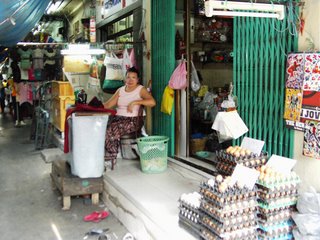
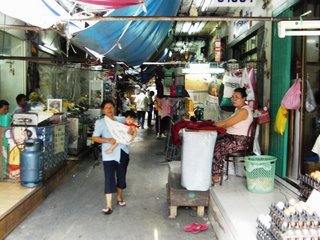
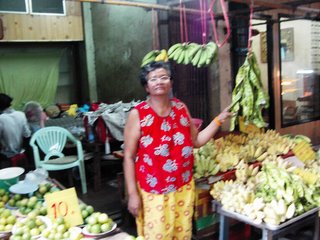
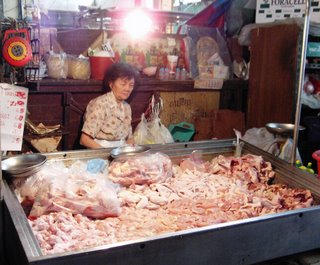
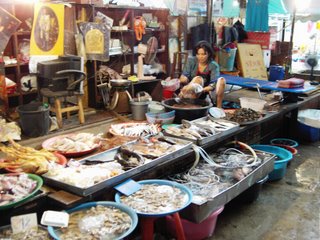
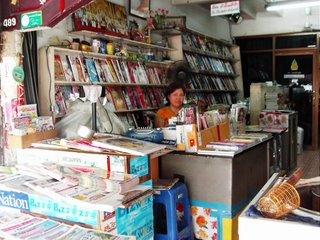
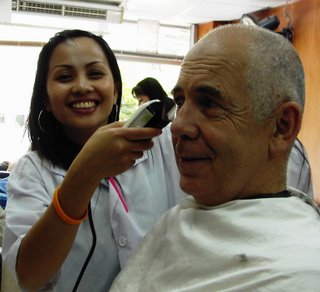

19th July 2006-07-20
Adam was feeling a lot better and left for at his usual time. The only thing that we had on the agenda for the day was accompanying Rosalind to hospital for out-patient surgery to have a ‘wart’ removed from the sole of her right foot. The hospital is a called Bumrungrad Hospital. It is the largest private hospital in Southeast Asia and the only hospital in Thailand accredited by the US based Joint Commission International on Accreditation. Bumrungrad is American managed and treats over 350,000 expatriate and foreign patients every year. It is perhaps an unfortunate sounding name that makes one think that they specialise in haemorrhoids, but believe me, and I know one or two things about hospitals, it would have to be one of the most impressive hospitals that I have ever seen. Not only is it very modern and exceptionally clean, all of the staff wear crisp clean starched uniforms from the cleaners to the doctors. And each uniform makes it very easy to identify who is the cleaner, who is the doctor, and who is the nurse. The aspect that amazed me the most was the large number of fully black veiled Muslim women patients. Apparently the hospital is very popular with many patients from the middle-east and given that money is no constraint it is reassuring to see that Bumrungrad is their hospital of choice.
Other aspects that were very satisfying were the speed with which we were processed from the reception area to a doctors consulting room. The doctor was a very pleasant man who spoke very good English and it took about five minutes for him to examine Rosalind’s foot , make the diagnosis and offer laser treatment of the wart on the day, immediately, now!. I was expecting the usual waiting around to see someone, eventually getting to see a grumpy doctor who would make a diagnosis, then ask you to make an appointment to get it seen to at a later date. No very impressed with the Thai medical system and I believe that all hospitals are obliged to provide the same care to Thai nationals for the cost of 20 baht, that is about eighty Australian cents. I think the longest part of the whole process was Khun Bon Chuay driving us to and from the hospital.
After delivering Rosalind back home and seeing her settled on the couch, Sheila and I were taken by Khun Boon Chuay to the ‘Emporium’ shopping centre where Sheila was to get some pain killing pills and some women’s magazine, a vital part of the recovery process. While Sheila was in the book shop I had a wander around a CD Store and bought a couple of VCDs one is ‘Walking the Line’ about Johnnie Cash and the other was ‘Finding Neverland’. However when we got back Rosalind told me that she already had a copy of ‘Finding Neverland’. Perhaps I would be able to return it and swap it for another?
Sheila also bought a large box containing bottles of chicken stock, I was a little puzzled by this purchase until I noticed the name on the box: ‘Scotch’; a parochial lot the Scots.
Sheila supervised Khun Noy in producing a pork stir fry with ginger, and we could hear a lot of laughter from the kitchen as Sheila’s attempts to harness Khun Noy’s enthusiasm were frustrated by the lack of a common language. The final result was very satisfying with Sheila’s insistence on the extra ginger adding to the piquancy. I must say that the broccoli was a little ‘aldente’, no it was a lot ‘aldente‘.
Rosalind told us that she has been trying for some time to get Khun Noy to stop cooking the stuffing out of the broccoli and guess that was the result. At best I think it was shown a pot of steaming water, but I don’t think it was immersed.
Adam had gone o the gym and had a workout getting home for dinner about 2100.
We ‘enjoyed’ another episode from an old series of Seinfeld, it was not on a DVD it was broadcast as part of one channel’s normal programming. Yes they do have ninety nine channels and one hundred of them broadcast crap most of the time and then it is mostly recycled crap that is many years old.
After dinner I amused myself on the computer by writing a little piece that was stimulated by a couple of pages from ‘Sophie’s World’, the book I had recently finished reading.
It is as follows:
COMMENCE THE TURNING
A spectre is haunting the developed world – the spectre is R.O.I Return On Investment.
I do not claim to be the author of the piece of work that follows; it is quite frankly a piece of plagiarism and paraphrasing of a famous author. For those people who know the work it will be easily recognisable, for the uninitiated it will allow them to read it though innocent eyes and not be blinded by the propaganda that is associated with the authors name.
‘There are three levels on which are society is based.
The first level is what is referred to as ‘conditions of production’ in other words the natural resources that are available to society. These natural resources often determine the type of industry that can be sustained and thereby the nature of that society and its culture in general, for example: you can’t have a fishing trawler fleet operating in the Gobi desert or grow oranges in Nova Scotia. And the way society functions in a nomadic agrarian culture is quite different from the way it functions in Silicon valley U.S.A; or the Australian aborigine who seeks access to the land in the same way they access air or sunlight is quite different from the process worker on a production line in a Bankstown factory.
The next level is the society’s ‘means of production’ i.e. the various kinds of equipment, tools, machinery, in addition to the natural resources that are necessary raw materials to feed the ‘means of production’.
Before industrialization then globalization the means of production tended to be co-located with the natural resources and value added to the raw materials before the product was traded. But now raw materials/conditions of production are shipped to whichever location of the means of production will offer the highest return on investment when traded.
The third level is ‘those who own the means of production’ and our societies function on the interaction of these three levels of society.
In all phases of history there has been conflict between the two dominant classes of society at that time. In antiquity the conflict was between the free citizen and the slave. In the feudal society it was between the feudal lord and the serf, later on between the aristocrat and citizen. Examples of these structures are still apparent in many developing nations. In more developed countries the conflict has been between those who own the means of production and those who do not. And since the owners of the means of production do not voluntarily relinquish their power this generates friction and impetus for change.
Many people in developing nations who are part of the ‘conditions for production’(i.e. some of the natural resources used in the production process), live under inhuman conditions while they continue to produce commodities that make the owners of both the ‘conditions for production’ and the ‘means of production’ richer; some people label this exploitation.
By way of explanation ‘if a worker produces a commodity, this commodity has a certain exchange value. If we now deduct the workers wages and other production costs from the exchange value, we have a sum called profit. The profit is accrued by the owner of the means of production as their due because of their investment/ownership of the ‘means of production.’
Workers in more developed countries are part of the ‘means of production’ and they are ‘owned’ to the extent they are prepared to exchange their labour for currency, but enjoy more humane conditions while contributing to the profit for the owner.
When the owner derives profit from the business activity, logically they invest some of their profit in improving the conditions and means of production in the hope of producing the commodity even more cheaply, and thereby increasing their profit in the future.’
However this logical system is ultimately self-destructive.
When the owner of the ‘means of production’ makes a profit and then uses part of the profit to improve the conditions and means of production, invariably they also expend profit on an improved personal lifestyle and or aspects of the business that add no value to the commodity being traded.
Also buying new machinery to increase the competitive pricing of the commodity means that the costs needed to be reduced often the cost of labour is reduced by paying the same or less to fewer people.
A recent manifestation of this is when jobs are exported to countries where cheaper labour is freely available and whenever the labour costs rise above an ‘acceptable’ level. E.g. When manufacturing was moved first of all to Japan post World War II, then Korea and now to China.
To maintain the expected return on investment the ‘conditions and means of production’ are continuing to be ‘improved’. Factories are becoming bigger and bigger with economies of scale being a major driving force, at the same time ownership of the ‘conditions and means’ of production are being gradually concentrated in fewer and fewer hands through mergers and acquisitions as the power of monopolies is realised.
However fewer and fewer workers are required which means there are more and more underemployed with its inherent increasing social concerns.
Another destructive element is that as a by-product of reducing the cost of labour ultimately the out of work poor can’t afford to be consumers of the commodities that they used to be paid to produce.
When the purchasing power of the consumer is reduced the death knell of a system whereby ownership is concentrated in the hands of a few is sounding more loudly.
What then of the future?
The proposition is that when ownership of the ‘means of production’ is vested with the participants of the ‘means of production’ the cycle of conflict will diminish; but only if we can limit the corruption that can accompany the power.
Commence the turning compiled by John Lunn 19th July 2006.
I asked Sheila to review it for me, and I made one change to one sentence, but I think Sheila is still not happy that my amendment has made the sentence anymore understandable. Ce la vie.
20th July 2006
Sheila did not sleep well last night so we were both very tardy at rising, Adam left for work as I had my breakfast and Sheila had still not surfaced. Rosalind went for her haircut today hobbling in a very stylish way. When Rosalind had first got up she made a pad from a sock and taped it to the heel of her foot to give her support to walk around without putting pressure on her sole. Effective but not the most elegant and I was not surprised that it had been ‘lost’ before she left for the hairdresser.
I decided to go for my walk to get my paper, have a hair cut and buy a few bananas from my usual supplier at ‘best’ price.
I went into my usual barber’s shop, but the lady who usually cuts my hair was busy shaving another chap, so I settled down in an armchair to wait. I had not waited long when another young lady entered the shop from behind some sliding glass screens at the back of the shop and gestured for me to take a seat in one of the vacant barber’s chairs.
As she put the apron around my neck and ‘asked’ me what haircut I wanted, I noticed a Thai man walk from behind the glass screens and out of the shop with a broad smile on his face. I thought no more about this until just after I had communicated the fact that I wanted my hair cut with a No1 cut. The young lady leant forwards and whispered into my ear. “you want massage”. I think I understood why the other chap had left the shop with a large smile on his face. I declined the offer and settled back to having the rest of my haircut. As I did so I heard another Thai lady who was sweeping up the hair make a comment that sounded like “farang key-knock”. I asked her if she had just said “farang key-knock”, she look very flustered. Rosalind had told us that the Thai often call foreigners ‘farang key-knock’ that roughly translated means ‘foreign little shit’.
Another Thai chap who was having his hair cut burst out laughing and said “he is only pretending that he does not understand Thai and you have been caught out.” I joined in the laughter much to the relief of the cleaning lady who was looking very worried.
I then asked the chap in the chair next to me to take a photograph of me while I was having my haircut; he happily agreed while telling me “she is very very good!” I did think she had done a good haircut. The young lady started to cut the ‘few’ hairs that sometimes grow in my ears but I indicated that I thought it better to pluck them out with tweezers. This she did, but from her squeals and facial expressions found it more painful than I did. I suggested that she also pluck a few from my nose, but this she found too painful to contemplate and I indicated that she should not worry and I would do it myself later. She finished off by giving my head and neck a great massage, all of it for 60 baht about 2$ Australian. I bought my paper and wandered back through the market taking a few pictures as I went and buying a large hand of bananas for 30 baht.
My barber
My paper shop
An alfresco restaurant opposite the paper shop
A fish monger
The chicken shop, I must admit I did not want to think too much about the bits at the bottom.
My ‘banana’ lady who give me the best price, my bunch were from the empty pink loop.
A soi in Suanplu market area, with grandma looking after the kid.
The seamstress wanted to pose at a better angle to show herself off to advantage.

0 Comments:
Post a Comment
<< Home